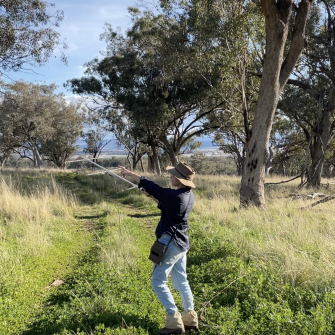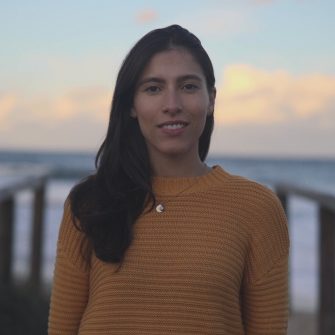Bachelor of Science (Advanced Mathematics) (Honours)
- Commencing Terms
- Term 1, 2 & 3
- Duration
- 4 Year(s)
- Delivery Mode
- Face-to-face (includes blended)
- Campus
-
Kensington
- Codes
- UAC code 429300
- Program code 3956
- CRICOS code 088843G
-
ATAR/2025 lowest selection rank
- 93.0 View all admission criteria
-
2026 Indicative first year full fee
- $7,500*
-
2026 Indicative full fee to complete degree
- $27,500*
-
2026 Indicative first year full fee
- $61,000*
-
2026 Indicative full fee to complete degree
- $266,500*

Application closures for 2026
Undergraduate programs for 2026 intakes are closed for New Overseas Student Commencement (NOSC) applications. Applications for postgraduate programs remain open. Find out if this closure applies to you.
- Overview
- Entry requirements
- What will I study?
- Future careers
- Double degrees
- How to apply
- Fees & Scholarships
Overview
Love maths? As the world relies more on data and modelling, sharp mathematicians like you are in high demand. Use your keen maths mind to design life-changing healthcare algorithms, predict environmental events, create smarter financial models or explore countless other career opportunities. Demand for mathematical science professionals is growing by around 5% each year, while roles for intelligence and policy analysts are projected to grow by 10% annually (Jobs & Skills Australia, 2025).
The Bachelor of Science (Advanced Mathematics) (Honours) at UNSW is a great way to prepare for a range of quantitative careers, including jobs in biostatistics, cryptography, data forensics, data management, environmental modelling, finance, game design, tech and more. Many of these careers offer strong earning potential, with average salaries ranging from $100,000 to $125,000 (Seek, 2025).
Over four years, you’ll complete foundational courses to build your skills before progressing to more advanced coursework, finishing with an honours-level research project. You can specialise in one of three majors: Applied Mathematics, Pure Mathematics or Advanced Statistics. Whichever path you choose, this honours program will get you ready for a variety of exciting roles.
Key features
Make your degree your own with flexible study options
Shape your degree to suit you. Choose electives based on your interests or even combine this program with a second degree from faculties like Art, Design & Architecture (ADA), Engineering, Law or Business.
Take on real-world challenges with your honours research project
In your honours year, you’ll work closely with a supervisor on a real research project, while also undertaking advanced coursework. You’ll grow your skills in problem-solving, critical thinking and independent research, setting you up for future study or work.
Get hands-on experience before you graduate
Get real-world experience through Work integrated Learning or research internships. You could work with startups, established companies, government departments or research teams. You’ll also earn course credit for this work.
Why study at UNSW?
Learn with the best
We’re ranked #2 in Australia and in the global top 50 for mathematics (QS World University Rankings by Subject, 2025). We provide comprehensive coverage of modern mathematics, underpinned by leading teaching and research.
Leverage our industry connections
As a global top 20 university (QS World University Rankings, 2024–2026), you can reach your career goals with industry relevant skills and training. We have links with many leading organisations such as the Roads and Maritime Services, CommBank and SIRCA. Our connections with industry give you the opportunity to apply your learning to real-world issues. Our industry connections also benefit from the mathematical insights of our talented students. Tap into our network of 400+ industry and research partners to start building your own professional connections.
Join our Talented Students Program
The Talented Students Program (TSP) introduces high-performing students entering selected science degrees to cutting-edge, world-class research in UNSW Science. TSP gives you the opportunity to engage in research experiences as early as possible to nurture the passion for research that all UNSW scientists share. Our previous TSP students have written research papers, attended conferences, integrated into research groups, developed peer groups and much more. All of these opportunities are available from year one of your science degree.
Want to see more from UNSW Science?
Bachelor of Advanced Mathematics (Honours) FAQs
Here are some things you might be wondering about studying a Bachelor of Advanced Mathematics (Honours) degree at UNSW.
-
Unlike the Bachelor of Science, which is more generalised, the Bachelor of Science (Advanced Mathematics) (Honours) has a strong focus on preparing you for a range of quantitative careers. It includes compulsory advanced maths coursework and offers specialised majors in Applied Mathematics, Pure Mathematics or Advanced Statistics.
-
A Bachelor of Science (Advanced Mathematics) (Honours) opens doors to a wide range of exciting, well-paid careers, including but not limited to biostatistics, cryptography, data forensics/fraud detection, data management, environmental modelling, game design, quantitative risk, research and teaching.
-
At university, the most advanced level of maths is typically an honours research project, followed by postgraduate research like a master’s or PhD. The Bachelor of Science (Advanced Mathematics) (Honours) is a great pathway if you want to keep studying maths at higher levels. If you’re excited to keep pushing the boundaries of maths, look at the Mathematics and Statistics PhD projects at UNSW.
-
Advanced maths in Australia builds on what you already know and teaches you how to use maths to solve complex real-world problems. It covers areas like pure maths, statistics and modelling, helping you prepare for jobs that require strong analytical and quantitative skills.
Entry requirements
-
- The 2025 Lowest Selection Rank (LSR) is the adjusted rank (ATAR plus adjustment factors) you would have needed to gain entry to this degree in 2025.
- The 2025 A levels score is based on four Advanced Level (A2) subjects. Entry scores are calculated from the best three or four A2 subjects (excluding repeated subjects) using the following values: A*=6, A=5, B=4, C=3, D=2, E=1. At most one Applied A Level subject may be included in the best four subjects used to calculate the aggregate.
- The 2025 IB Diploma is an indication of the IB you would have needed to gain entry to this degree in 2025. It is to be used as a guide only.
- The 2025 Lowest ATAR is the lowest ATAR (before adjustment factors were applied) to which an offer was made. Where <5 is listed, this indicates that less than 5 ATAR-based offers were made and so the score has not been published. N/A indicates no offers were made on the basis of ATAR.
*The Lowest ATAR to which an offer was made, for this program, is based on a UNSW Gateway Early Conditional Offer.
-
At UNSW, we are committed to ensuring prospective students have all the information they need in order to make informed decisions about their study options.
To assist you in gaining a better understanding of how Admissions works at UNSW, we have provided you with a summary of ATAR offers and the student profile.
We hope this information will help you identify the degree that is right for you.
Assumed knowledge
Mathematics Extension 1
Adjustment Factors
We offer a range of adjustment factor schemes that reward students for academic performance and extra-curricular achievements. These schemes also take into account a range of personal and educational disadvantages that may have affected your studies.
HSC Plus
This scheme rewards students who perform well in Year 12 subjects that are relevant to their preferred UNSW degree. You may be awarded up to five points.
Elite Athletes, Performers and Leaders (EAPL)
This program recognises achievements in the areas of sport, academia, leadership and music at an elite level. You may be eligible for up to five points.
Educational Access Scheme (EAS)
Factors such as illness, financial hardship, language difficulties or attending a particular school can mean you don't always get the best possible marks in Years 11 and 12. If one of these situations applies to you, submit an application for the Educational Access Scheme (EAS) via UAC. Eligible students can receive between 1 and 10 points towards their chosen UNSW degree.
Admission pathways
Your ATAR is not the only measure of your potential to succeed, which is why we offer a range of pathways into university. Explore your options below and get in touch with our Future Student Advisers to discuss your path to UNSW.
Gateway Admission Pathway
This scheme is open to students who attend Gateway schools, live in a low-socioeconomic area based on IRSAD and IEO indexes of SEIFA criteria, or are an Aboriginal and Torres Strait Islander person. It adjusts the ATAR requirements for your preferred UNSW degree and provides early offers and early conditional offers to UNSW.
Entry programs for Australian Aboriginal and Torres Strait Islander people
We offer entry programs for Indigenous Australians, including the Indigenous Preparatory Programs and the Indigenous Admission Scheme (IAS). The entry pathway program you apply for will depend on the degree you want to study.
English language requirements
You may be asked to provide evidence of your English proficiency to study at UNSW depending on your educational background and citizenship. English language skills are vitally important for coping with lectures, tutorials, assignments and examinations - this is why UNSW requires a minimum English language competency for enrolment.
If you’re completing an Australian Year 12 qualification (e.g. NSW HSC or equivalent), you do not need to provide anything extra to prove your proficiency. Your qualification will be used as evidence of your English proficiency.
If you do need to provide evidence of your English proficiency, this will be indicated in your application. You can prove this by providing evidence that you meet one or more of the following criteria:
- English language tests and university English courses
- Prior study in the medium of English
- Other qualifications
If you need to improve your English skills before you start your degree, UNSW College’s Academic English Programs are for you. The programs are suitable for various English levels and help you prepare for university studies and life in Australia.
For more details, visit the English Language Requirements page.
International direct entry
Information for applicants with CBSE, HKDSE or Singapore A Levels Qualification
Calculating your CBSE Score:
Awarded by CBSE, average percentage marks across English or Hindi, and your best four remaining subjects. Where marks are given as a range, the mid-point for that range is used e.g. 75 to 80 = 77.5.
Calculating your HKDSE Score:
Entry requirements are based on the aggregate of the best 5 achieved category A subjects (category B and C subjects are not considered).
For subjects other than Citizenship and Social Development: level 5**=7 points, level 5*=6 points, level 5=5 points, level 4=4 points, level 3=3 points, level 2=2 points, level 1=1 point, Level U=0 point.
For subject Citizenship and Social Development: Attained=2 points, Unattained=0 point. Citizenship and Social Development will only be counted towards the aggregate if the 2 points awarded for Attained ranks among the student’s best five scoring subjects.
If Mathematics Compulsory Part and Extended Part (Module 1 or 2) are both presented, both scores can be counted.
Calculating your Singapore A Levels:
Due to significant changes to the GCE A-Level Curriculum and University Admissions Score (UAS) calculation effective 2026, UNSW assessment is currently under review.
Note: Entry requirements published on this page are correct as of the day of publication and may change without notice.
We do not accept secondary qualifications from this country. We may accept tertiary study results, please contact us for more information.
Please contact us for direct entry requirements.
Admission pathways
If you do not meet the requirements for direct entry into your chosen degree, you may be eligible for a pathway program with UNSW College. UNSW College provides alternative entry options using university-approved content so that you can start your UNSW journey with confidence.
English language requirements
You may be asked to provide evidence of your English proficiency to study at UNSW depending on whether you are from an English-speaking background or non-English speaking background. English language skills are vitally important for coping with lectures, tutorials, assignments and examinations - this is why UNSW requires a minimum English language competency for enrolment.
If English is not your first language, you’ll need to provide proof of your English proficiency before you can be given an offer to study at UNSW. You can do this by providing evidence that you meet one or more of the following criteria:
- English language tests and university English courses
- Prior study in the medium of English
- Other qualifications
If you need to improve your English skills before you start your degree, UNSW College’s Academic English Programs are for you. The programs are suitable for various English levels and help you prepare for university studies and life in Australia.
For more details, visit the English Language Requirements page.
Check the specific English language requirements for this program
What will I study?
UNSW is introducing a new academic calendar from 2028.
We are moving to a new flex-semester calendar. What does this mean for your studies?
Program structure
This specialised program focuses on advanced mathematics coursework. This includes majors in applied mathematics, pure mathematics and advanced statistics.
You’ll start with foundational courses to build on your core skills, then progress to advanced maths courses in your chosen specialisation and your honours-level research project. If you’re studying a single degree, you can also choose electives and general education courses from any UNSW faculty.
Full program structure
The Bachelor of Science (Advanced Mathematics) (Honours) is four-year, full-time degree. Students must complete 192 UOC when taken as a standalone program. However, this degree is available as a double degree, where you’ll have the opportunity to round out your studies with a complementary program from UNSW Science or another faculty.
-
As a single degree, the Bachelor of Science (Advanced Mathematics) (Honours) is made up of 24 courses plus an honours year taken over four years of full-time study.
Type
Units of Credit (UOC)
Number of courses
Major
84
14
SCIF1131 (core course)
6
1
Science electives
6
1
Honours year
Your honours year (48 UOC) includes coursework and a thesis component.
Free electives
36
6
General education
12
2
-
As a double degree, the Bachelor of Science (Advanced Mathematics) (Honours) is made up of 16 courses plus an honours year taken simultaneously with courses from your other degree. Students undertaking a double degree do not take general education or free elective courses.
Type
Units of Credit (UOC)
Number of courses
Major
84
14
SCIF1131 (core course)
6
1
Science electives
6
1
Honours year
Your honours year (48 UOC) includes coursework and a thesis component.
Other degree
96 or 144
16-24
Majors
-
Learn how to understand and solve real-world problems using maths. Example courses include Mathematical Modelling, Computational Methods for Finance, Differential Equations and Biomathematics.
-
Dive into the core ideas behind all maths, exploring patterns and structures. Example courses include Abstract Algebra, Higher Algebra, and Higher Topology and Differential Geometry.
-
Discover how to make sense of big, complex data sets. Example courses include Statistical Methods in Social and Market Research, Higher Theory of Statistics, and Higher Linear Models.
Future careers
Mathematics plays a key role in everything from finance and tech to healthcare, government and climate science. With a Bachelor of Science (Advanced Mathematics) (Honours) from UNSW, you’ll graduate with in-demand skills in data analysis, problem-solving and critical thinking.
Demand for mathematical science professionals is growing around 5% annually, with roles in intelligence and policy analysis projected to grow even more quickly (Jobs & Skills Australia, 2025). Whether you’re designing algorithms, modelling environmental change, managing data or advising on policy, this degree opens the door to a wide range of rewarding, high-impact careers. Many roles also offer strong earning potential, with average salaries sitting between $100,000 and $125,000 (Seek, 2025).
Job opportunities for a Bachelor of Advanced Mathematics (Honours) graduate
Here are just some of the roles you could step into after graduating:
| Industry | Job opportunities |
| Finance | Financial quantitative analyst, quantitative risk analyst, data analyst |
| Technology | Cryptographer, data forensic analyst, data manager, game designer |
| Healthcare and biotechnology | Biostatistician, statistician |
| Government | Policy analyst, operations researcher, data forensic analyst, statistician |
| Environment and science | Environmental modeller, systems modeller, research mathematician |
| Education and research | Mathematics teacher, teaching fellow, research mathematician |
Our alumni
"My first reason for choosing to study mathematics at UNSW was because of the quality and diversity of the faculty, which is one of the largest and most respected in Australia. This gave me the opportunity to study mathematics at a very high level over a broad range of fields. Secondly, a mathematics degree at UNSW gave me a lot of flexibility with what I wanted to study. This allowed me to extend myself with higher levels of mathematics, as well as to study courses outside of mathematics which I found interesting."
Anthony Morris
Staff Software Engineer, Google
"In the earlier years of my degree, I was exposed to a broad range of mathematical concepts, drawing on things only touched upon in high school. In the upper years, I was then able to choose which part of math really interested me and hone in on my skills by completing focused subjects in the area. The small classes and dedicated time with the academics meant that I was always able to achieve a deeper level of understanding, even with the trickier concepts."
Miriam Greenbaum
Consultant, Business Consulting (Finance), Ernst & Young
Double degrees
Our double degrees enable you to broaden your opportunities and study different areas simultaneously. You can combine the Bachelor of Advanced Mathematics (Honours) with one of the following to form a double degree:
How to apply
Applications for undergraduate study from domestic students (Australian citizens, Australian permanent residents, Australian permanent humanitarian visa holders and New Zealand citizens) are processed by the Universities Admissions Centre (UAC).
Visit the Apply section of the UAC website and you can nominate up to five degrees in order of preference, with the first being your most desired degree and university.
On-time applications for admission usually close at the end of September each year for Term 1 admission. Late applications can be submitted, but a late fee will apply. For study starting in Term 1, the majority of offers are made in December and January. Visit the UAC website for key dates for admission outside of Term 1.
Ready to start your application?
For most international students, applications are submitted via our Apply Online service. We encourage you to submit your completed application as early as possible to ensure it will be processed in time for your preferred term.
Some high-demand programs with limited places, may have an earlier application deadline or may have an earlier commencement date. For details, visit the international admissions information page.
*If you are an international student studying an Australian qualification, go to the Universities Admission Centre (UAC) for application and UAC key dates. Note: If you are under 18 years of age, you need to make special arrangements. For details, visit the under 18 international students page.
Ready to start your application?
Fees & Scholarships
Commonwealth Supported Place: Student Contribution Band 1
*The student contribution for a Commonwealth Supported Place is an indication only of the amount payable in Year 1 based on a standard full-time load of 48 credit points (1.0 EFTSL). The actual student contribution you will be liable for depends on your individual program of study and the calendar year in which you enrol. Actual fees are calculated upon enrolment. Student contribution amounts are subject to annual review by the university and may increase each year during your studies (subject to caps determined by the Australian Government), effective at the start of each calendar year.
The indicative fees listed here are based on an estimated average and are for tuition only - other fees and charges are not included.
*Fees are subject to annual review by the University and may increase annually, with the new fees effective from the start of each calendar year. The indicative fees listed here are based on an estimated average and are for tuition only, other fees and charges are not included. The amount you pay will vary depending on the calendar year to enrol, the courses you select and whether your study load is more or less than 1 Equivalent Full Time Student Load (8 courses per year).
Indicative fees are a guide for comparison only based on current conditions and available data. You should not rely on indicative fees. More information on fees can be found at the UNSW fees website.
Indicative fees to complete the program have been calculated based on a percentage increase for every year of the program. Fee increases are assessed annually and may exceed the indicative figures listed here.
Indicative fees to complete the program include tuition plus an estimate of study-related costs of approximately $1,000 per year. To find out more about other costs, visit UNSW International.
Scholarships
At UNSW, we award over $83 million in scholarships each year. We pride ourselves on rewarding excellence and making university accessible to students from all walks of life. Whether you’re a domestic or international student, our range of scholarships, prizes and awards can support your journey.
Featured scholarships
- UNSW Mathematics Scholarship (UGCA1108)
- School of Mathematics and Statistics Beautiful Mind Scholarship (UGCA1392)
- Faculty of Science Scholarship (UGCA1106)
- The Ian and Barbara Burgess Memorial Rural Science Scholarship (UGCE1466)
- Women in Science Scholarship (UGCA1599)
- Science Achiever Award (UGCA1358)
- School of Mathematics and Statistics Indigenous Scholarship (UGCE1268)
- School of Mathematics and Statistics Rural Student Scholarship (UGCE1079)
Featured scholarships
- UNSW Mathematics Scholarship (UGCA1108)
- School of Mathematics and Statistics Beautiful Mind Scholarship (UGCA1392)
- Science Achiever Award (UGCA1358)
Progress starts here – at a world-leading university

Top 20 Worldwide
Ranked in the global top 20 for three consecutive years
QS World University Rankings, 2024–2026

Winner of the AFR Most Employable University Award six years in a row
AFR Top100 Future Leaders Awards, 2020–2025

Australia's #1 for Innovation
Highest number of startups and spinouts from university-developed tech
SCOPR report, 2024






